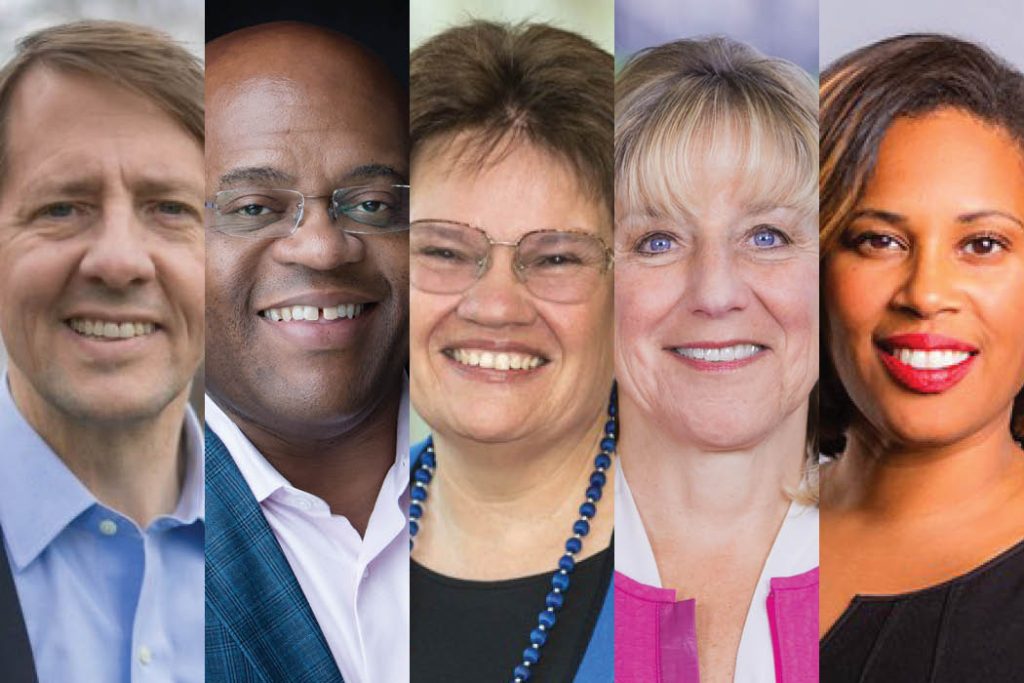The Rappaport Center for Law and Public Policy continued its fall webinar series October 29 with a discussion about race and economic justice during the current pandemic and beyond. Panelists offered their perspectives on these issues and outlined the path forward for Massachusetts in a time of unprecedented uncertainty and change.
In her welcome, BC Law Professor Patricia McCoy offered sobering statements about current realities. “People of color are disproportionately suffering from the twin pandemics of Covid-19 and income insecurity; meanwhile, the murder of George Floyd highlighted the threat of violence under which so many black people live,” she said. “In 2017, the Federal Reserve Bank of Boston reported that the median net worth of black households in the greater Boston area was $8 dollars.”
Moderator Richard Cordray, former Ohio Attorney General and current Jerome Lyle Rappaport Distinguished Visiting Professor in Law and Public Policy, followed with these remarks: “Racial disparities and racial injustice are a part of the texture of American society. That is the way it is; it’s not the way it should be, it’s not the way we want it to be, and it’s not the way we hope it will be forever. We have seen African American unemployment and Latino unemployment spike heavier than the total unemployment; that’s a differential impact.”
Panelist William Cowan, former US Senator and president of Global Government Affairs and Policy and Developed Markets for General Electric Co., spoke of his greatest fear as the nation attempts to bridge the divide separating communities and society as a whole. “I’m worried about where we find ourselves today. I’m worried because I wonder—and I still am not yet convinced—whether, collectively, we will have the enthusiasm and stamina to continue to grapple with these issues” he said.
Cowan explained that his fear does not represent a lack of faith in the American people. Rather, it is a result of the lasting history of the country’s plague of systemic racism and the repeated cycle of failed attempts to make a lasting change. “There are no easy answers,” he said. “We are talking about hundreds of years of systemic challenges that we have not tackled deeply, successfully, and strategically enough.”
McCoy, Cowan, and fellow panelist Karen Spilka, Massachusetts Senate President (D-Ashland), all referred to the current public health crisis and the issues of systematic racism as the “twin pandemics” damaging the society.
“Covid has ravaged our communities, and in the senate, we have tried to prioritize some of the economic inequities that have been made much worse by these two pandemics,” Spilka said. “The state senate, I know, does not reflect the diverse makeup of the Commonwealth. There have been times in our Commonwealth’s history when equity may not have been the goal of the state legislature.”
Spilka has served as the senate president for two years. She explained that in her new position, her goals and the subsequent senate goals have been set on changing the way the legislature addresses equity and inclusion. “We must look at every bill, both small bills and big bills, through the lens of equity and inclusion and be intentional about it, she said. “I have long argued that when everyone is given the opportunities and tools to participate in our economy we will succeed; we all succeed.”
A common theme throughout the discussion was the need for business leaders to get more involved in solving these problems.
Panelist Tanisha M. Sullivan ’02, president of the Boston branch of National Association for the Advancement of Colored People (NAACP) and a Rappaport Center Advisory Board member, said: “It is the responsibility of the business community to actively participate in efforts to address systemic racism. The reason being: the business community has historically played a role in the development, implementation, and advancement of policies that have been designed to exclude.”
Sullivan mentioned redlining, mortgage lending, life insurance policies, hiring practices, and supplier diversity policies as examples of the business community failing to be inclusive and perpetuating the issue of exclusion. She added: “It is incumbent upon the business community to play an active role in the undoing of those policies and therefore replace those policies with ones designed to be intentionally inclusive.”
As the discussion came to a close, Cowan was called upon to offer a few final words to the audience.
“I’ve never lost faith in the concept of America and what we stand for, but I am longing for us to actually be and become that which we hold ourselves out to be. For us to get there, these are the kinds of issues we must grapple with and commit ourselves to improve upon so that all of us—whether new to this nation or otherwise; whether black, white or otherwise; whether gay, straight, man or woman—we all feel like that opportunity that is embedded in our founding documents is truly available to all of us in an equitable fashion,” Cowan said. “That is when we will be at our best. That is the American ideal.”
Photo, from left, Richard Cordray, William Cowan, Patricia McCoy, Karen Spilka, and Tanisha Sullivan


